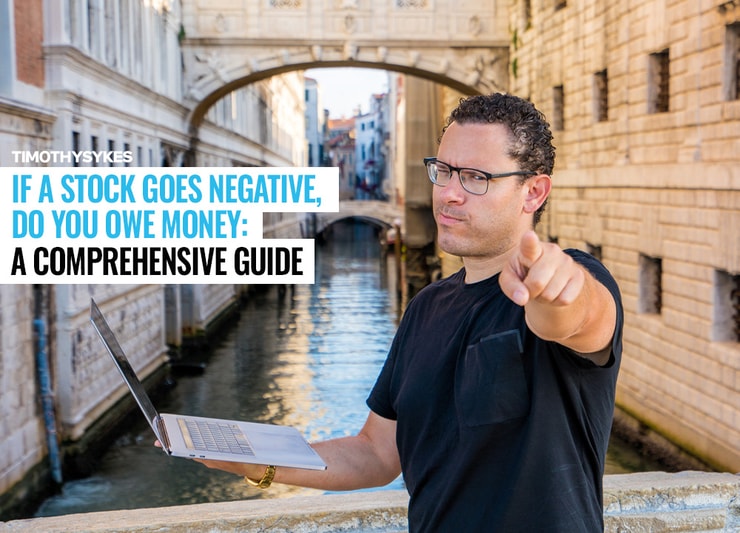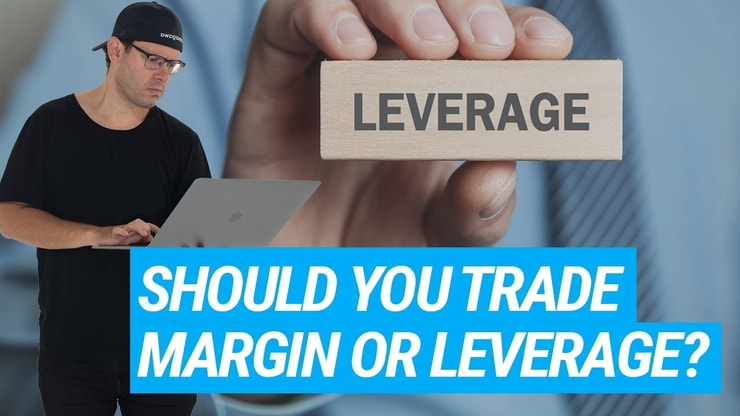If a stock goes negative, do you owe money? This question haunts many beginner traders.
The short answer is generally no, but there are exceptions. This guide will you what happens when a stock’s value declines and how to protect your investments.
Table of Contents
- 1 What Is the Value of a Stock?
- 2 Can You Lose Money If a Stock’s Value Goes Down?
- 3 Can You Owe Money in Stocks?
- 4 What Happens When Your Stock Goes Down?
- 5 How To Avoid Losing Money on Poorly Performing Stocks
- 6 Can You Lose More Money Than You Invested?
- 7 What Determines the Value of a Stock?
- 8 Tips To Protect Your Money While Trading in Stocks
- 9 Key Takeaways
- 10 FAQs
- 10.1 Do I Owe Money if a Stock Goes Down?
- 10.2 What Happens if a Stock Goes to Zero?
- 10.3 What’s the Difference Between a Cash and a Margin Account?
- 10.4 What Happens During a Margin Call If My Stocks Perform Poorly?
- 10.5 How Do Different Trading Strategies Respond to Poor Stock Performance?
- 10.6 Are ETFs Less Risky Than Individual Stocks in a Volatile Market?
- 10.7 What Are the Implications of Poor Stock Performance on Cash Accounts?
- 10.8 How Do Emotional Factors Influence Trading in a Down Market?
- 10.9 How Does Supply and Demand Influence the Stock Market in Case of Security Issues?
What Is the Value of a Stock?
The value of a stock is determined by various factors, including the company’s performance, market demand, and investor sentiment. It’s not just about numbers; it’s about the company’s standing in the business world. I’ve seen stocks soar based on news or plummet due to poor earnings reports.
Can You Lose Money If a Stock’s Value Goes Down?

Absolutely, you can lose money if the stock’s value goes down. But let’s break it down further.
On a related note, you might be wondering what happens if a stock actually goes negative. Is it possible to owe money in such a scenario? I’ve got an entire blog post that dives deep into this topic. It’s essential to understand the nuances, especially if you’re trading on margin. Want to know more? Check out my post “If a Stock Goes Negative, Do You Owe Money?”.
Can You Owe Money in Stocks?
Yes, you can owe money in stocks if using a margin account, where you borrow funds from a broker to buy shares. In this setup, you must repay the loan even if the stock’s value drops, potentially resulting in losses greater than your initial investment. Cash accounts, however, limit losses to your initial investment only.
Do You Owe Money If a Stock is Worth Less Than You Paid for It?
If a stock is worth less than you paid for it, you don’t owe money; you’ve just incurred a paper loss. It’s unrealized until you sell the stock.
Can You End Up in Debt If a Stock Goes Down?
In a standard cash account, you can’t end up in debt if a stock goes down. However, if you’re trading on margin, that’s a different story. Margin accounts can lead to debt if you’re not careful.
More Breaking News
- Rezolve AI Unveils Bold Partnerships and Debt Conversion: Future Market Potential on the Rise?
- Seagate’s Stock Skyrockets, But Is It Justified?
- Riot Platforms Inc. Stock: A Rollercoaster with Cryptocurrency’s Wild Swings
If a stock goes to zero, your investment is wiped out. You don’t owe additional money unless you’ve been trading on margin. I’ve always advised my students to understand the risks involved in margin trading.
What Happens When Your Stock Goes Down?
When a stock goes down, its market value decreases, affecting your investment portfolio. It’s not the end of the world, but it’s a situation that requires attention.
How To Avoid Losing Money on Poorly Performing Stocks
Avoiding losses is crucial in trading. Here’s how you can minimize risks based on my years of trading and teaching.
Diversify Your Portfolio
Don’t put all your eggs in one basket. Diversification can help mitigate losses.
You might also want to consider fractional shares. These allow you to invest in high-value stocks without breaking the bank. It’s a strategy that can fit well into a diversified portfolio. Want to explore this option? Read my blog post “Can You Buy Fractional Shares on TD Ameritrade?”.
Adopt a Long-term Perspective
Short-term market fluctuations are common. A long-term perspective can often weather market volatility.
Understand Your Investments
Know what you’re investing in. Research the company, its performance, and market trends.
Regularly Review Your Portfolio
Keep an eye on your investments. Make adjustments as needed based on performance and market conditions.
Use Stop-Loss Orders
Stop-loss orders can protect you from significant losses. I often use this strategy to limit potential downside.
Invest in Quality Companies

Quality companies are generally more resilient during market downturns. Look for companies with strong fundamentals.
Monitor Market and Economic Trends
Stay updated with market news and trends. This information can help you make informed decisions.
Manage Your Emotions
Trading is not just about numbers; it’s also about managing your emotions. Don’t let fear or greed dictate your trading decisions.
Consult a Financial Advisor If Needed
If you’re unsure, don’t hesitate to seek professional advice. An advisor can provide personalized guidance tailored to your financial goals.
Can You Lose More Money Than You Invested?
In a standard cash account, you can’t lose more money than you invested. However, if you’re trading on margin, you can end up owing money to your broker.
What Determines the Value of a Stock?
The value of a stock is determined by a myriad of factors, including company performance, market demand, and investor sentiment. Understanding these can help you make better investment decisions.
When you’re learning to trade, you should focus your attention on stock prices with the leverage to go positive — to “outperform” their current profit levels and crush the bears shorting them! This term can give you insights into a stock’s potential and how it stacks up against others in the market. I’ve covered this topic in detail, explaining what factors contribute to a stock being labeled as an outperformer. Curious? Dive into my article “What Does Outperform Mean in Stocks?.”
Tips To Protect Your Money While Trading in Stocks

Protecting your money while trading in stocks is crucial. Here are some tips based on my experience in trading and teaching.
Focus on Long-term Investments
Long-term investments are generally less risky compared to short-term speculations.
Understand Your Investments
Knowledge is power. The more you know about your investments, the better decisions you’ll make.
Regularly Review Your Portfolio
A periodic review of your portfolio can help you weed out poor-performing stocks.
Use Stop-Loss Orders
Stop-loss orders are your best friend when it comes to limiting losses.
Invest in High-Quality Companies
Quality over quantity. High-quality companies often offer more reliable returns.
Stay Informed About Market Trends
Information is crucial. Stay updated with market news to make informed decisions.
Manage Your Emotions
Emotional decisions often lead to losses. Keep a cool head to make rational decisions.
Consider Seeking Professional Advice
If in doubt, consult a financial advisor. It’s better to seek professional advice than to make uninformed decisions.
Key Takeaways

Understanding the mechanics of what happens when a stock goes down can save you from significant financial pitfalls. Always remember, you generally won’t owe money if a stock goes negative, unless you’re trading on margin.
Trading isn’t rocket science. It’s a skill you build and work on like any other. Trading has changed my life, and I think this way of life should be open to more people…
I’ve built my Trading Challenge to pass on the things I had to learn for myself. It’s the kind of community that I wish I had when I was starting out.
We don’t accept everyone. If you’re up for the challenge — I want to hear from you.
Apply to the Trading Challenge here.
Trading is a battlefield. The more knowledge you have, the better prepared you’ll be.
Do you have questions about the REAL RISKS of trading? Let me know in the comments — I love hearing from my readers!
FAQs
Do I Owe Money if a Stock Goes Down?
Generally, no. You don’t owe money just because a stock goes down. However, margin trading can be an exception.
What Happens if a Stock Goes to Zero?
If a stock goes to zero, you lose your investment. You don’t owe additional money unless you’ve been trading on margin.
What’s the Difference Between a Cash and a Margin Account?
A cash account requires you to pay for securities in full at the time of purchase. A margin account allows you to borrow money against your investments and can lead to debt if not managed carefully.
What Happens During a Margin Call If My Stocks Perform Poorly?
In a margin account, a margin call is a broker’s demand for an investor to deposit additional funds or assets if the value of the loaned amount in the account drops to a certain level. For example, if you have purchased a stock on margin and its price plummets, you could face a margin call. Failing to meet this requirement can negatively impact your credit score and could result in your broker selling assets in your account to cover the loan.
How Do Different Trading Strategies Respond to Poor Stock Performance?
Day traders, swing traders, and position traders each have distinct approaches for when a stock performs poorly. Day traders might exit positions quickly to cut losses, while swing traders could look for opportunities to profit from further downtrends. Bulls, investors who are generally optimistic, may view downturns as buying opportunities. However, it’s important to be mindful that all trading strategies come with inherent risks and potential rewards.
Are ETFs Less Risky Than Individual Stocks in a Volatile Market?
Exchange-Traded Funds (ETFs) often provide more diversification compared to individual stocks, which could be advantageous in a volatile market. Brokers often provide a range of ETF options and other services to help investors manage risks. However, it’s crucial to understand that all investments come with some degree of risk, and you should be aware of the commission fees associated with trading ETFs.
What Are the Implications of Poor Stock Performance on Cash Accounts?
In cash accounts, you can only lose up to the amount you initially invested plus any commission fees, as you are not trading on borrowed money. Therefore, you won’t face interest charges or a margin call. Your potential loss is limited to the initial purchase price of the stock and the associated trading costs.
How Do Emotional Factors Influence Trading in a Down Market?
When stocks perform poorly, emotional elements such as fear and greed can greatly affect investors’ decisions. Some individuals may take on a gambler’s mindset, pursuing high-risk, high-reward opportunities. Keeping a balanced mindset and sticking to a well-thought-out investment strategy is important, particularly when considering the services and advice provided by brokers.
How Does Supply and Demand Influence the Stock Market in Case of Security Issues?
Supply and demand are fundamental factors in determining stock prices in the stock market. In the case of a security issue, such as a data breach, the supply of sellers may outweigh the demand from buyers, leading to a decline in the stock price. Depending on the type of security issue, long-term and short-term investors may have different reactions, which could further influence market dynamics. It’s crucial for investors to keep abreast of such events and assess their potential impact on their portfolios.




Leave a reply